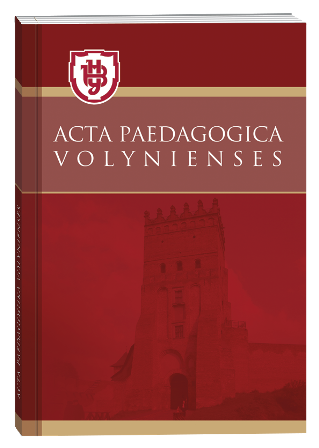FORMATION OF FOREIGN LANGUAGE LEXICAL COMPETENCE OF STUDENTS OF HIGHER EDUCATIONAL INSTITUTIONS BY MEANS OF BRAINSTORMING
DOI:
https://doi.org/10.32782/apv/2022.4.16Keywords:
foreign language speech activity, communication, brainstorming, lexical competence, students of higher educational institutionsAbstract
The article examines the foreign language lexical aspect of the problem of using interactive brainstorming technology at practical English language classes. Learning vocabulary is an important component of the process of forming foreign language communicative competence. It is known that the modern requirements of vocabulary learning are best met by interactive learning methods. They provide an opportunity not only to realize learning goals, but also to increase motivation to learn the language. Lexical competence is characterized as a system of three closely related dimensions: knowledge of the meaning of a word, its (knowledge) depth, and the ability to understand the effective possibilities of using a word in context. In the process of learning a foreign language, it is important to focus attention on various ways of forming receptive (perception, understanding, recognition of words in the text) and reproductive (use of words in speech or writing) lexical skills, which will become the basis for creating lexical skills (lexical awareness) – the student’s ability not only to memorize lexical units, but also to its active (subconscious) use in unprepared or prepared speech acts, depending on the situation. Brainstorming is presented as an effective interactive method to encourage all students without exception to speech activity, and is also designed to activate and mobilize passive lexical resources, creating a series of combined ideas that will lead to the correct organization of speech. Based on the textbooks «Prepare. Student’s book and Teacher’s book from Cambridge University Press», focused on the development of all types of students’ speaking activities according to the principle of their interconnected learning, fragments of various blocks with tasks and recommendations using brainstorming elements are presented, which organically complement the process of the lesson on various topics.
References
Бурлаков М. П. Деякі питання формування іншомовної лексичної навички говоріння. Іноземні мови. 2007. № 2. С. 54–56.
Гаврилюк Н. М. Принципи навчання лексиці на заняттях з іноземної мови у вищих навчальних закладах. URL: http://nbuv.gov.ua/UJRN/Sitimn_2015_41_53 (дата звернення: 20.09.2022).
Голодюк Л. В. Інтерактивні методи навчання на уроках англійської мови. URL: https://naurok.com.ua/interaktivni-metodi-navchannya-na-urokah-angliysko-movi-263727.html (дата звернення: 22.09.2022).
Загальноєвропейські рекомендації з мовної освіти: вивчення, викладання, оцінювання. URL: http://www.khotiv-nvk.edukit.kiev.ua/Files/downloads/zagalnoyevrop_rekom.pdf (дата звернення: 25.09.2022).
Kosta J., Williams M. Prepare. Student’s book. A2. Level 3. Cambridge : Cambridge University Press. 2nd edition, 2019. 166 p.
Rimmer W. Prepare. Teacher’s book. A2. Level 3. Cambridge : Cambridge University Press. 2nd edition, 2019. 308 p.







